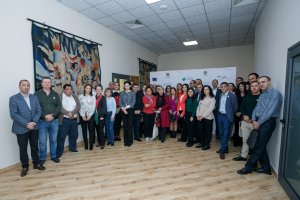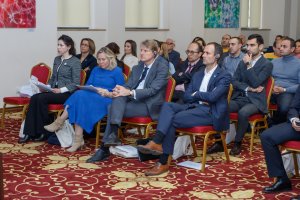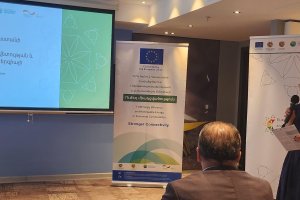
EU4Energy Efficiency and Renewable Energy in Armenian Communities
Project Description
The Project is part of the EU Action EU4Energy Efficiency and Environment and of the “Management of natural resources and safeguarding of ecosystem services for sustainable rural development in the South Caucasus” (ECOserve) programme, which is commissioned by the German Federal Ministry for Economic Cooperation and Development (BMZ) and implemented by Deutsche Gesellschaft für Internationale Zusammenarbeit (GIZ) GmbH.
Specific Objective
Communities and households have better access to energy efficiency and sustainable energy solutions, thereby contributing to the improved energy security of the rural population and the conservation of natural resources.
The project contributes to the overall objective of the EU Action, which is to improve energy efficiency and enhance environmental protection and resilience.
The project contributes to the overall objective of the EU Action, which is to improve energy efficiency and enhance environmental protection and resilience.
Expected Results
• The use of locally produced energy-efficient stoves based on solid biomass fuel is promoted in vulnerable, low-income households.
• Local craftsmen, producers, or relevant organizations are trained in the production and marketing of energy-efficient heating devices that are based on solid biomass.
• Demonstration pilots are implemented in selected households, including a pilot for (partial) thermal insulation and possibly other innovative measures based on initial feasibility studies and assessments.
• Small-scale RE (PV installation of up to 5 KW, solar water heaters) and/or basic EE measures in small public/community buildings are promoted.
• Larger scale RE (PV installations of about 20-25 KW or larger) and EE measures are supported in public/community buildings with high impact on a large proportion of the local population, for example, more than 50 beneficiaries per building.
• Exchange of best practices and awareness-raising on EE and RE are supported among local communities, between the marzes and country-wide.
• The possibilities of agricultural production of alternative biomass and promoting alternative biomass fuel are explored.
• Local craftsmen, producers, or relevant organizations are trained in the production and marketing of energy-efficient heating devices that are based on solid biomass.
• Demonstration pilots are implemented in selected households, including a pilot for (partial) thermal insulation and possibly other innovative measures based on initial feasibility studies and assessments.
• Small-scale RE (PV installation of up to 5 KW, solar water heaters) and/or basic EE measures in small public/community buildings are promoted.
• Larger scale RE (PV installations of about 20-25 KW or larger) and EE measures are supported in public/community buildings with high impact on a large proportion of the local population, for example, more than 50 beneficiaries per building.
• Exchange of best practices and awareness-raising on EE and RE are supported among local communities, between the marzes and country-wide.
• The possibilities of agricultural production of alternative biomass and promoting alternative biomass fuel are explored.
Project map
Launch Event
FEASIBILITY STUDY ON CULTIVATION OF AGRICULTURAL CROPS TO SERVE BOTH FOR AGRICULTURAL AND ENERGY PURPOSES” PRESENTATION OF REASEARCH RESULTS WORKSHOP_27 July_ANAU
PROJECT DETAILS
Armenia
Priority Area:
Partnership that greens Subsector:
Energy & energy efficiency Topic:
Energy Project Status:
Completed Start Date:
15.01.2023 End Date:
14.11.2024 

